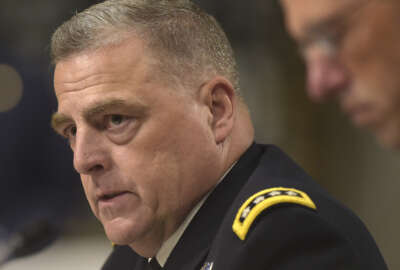Best listening experience is on Chrome, Firefox or Safari. Subscribe to Federal Drive’s daily audio interviews on Apple Podcasts or PodcastOne.
The Army is changing its education system to make it easier for soldiers to obtain college credit and occupational credentials.
Moving toward a more accredited curriculum is meant to help soldiers once they get out of the service, as well as aid them in following the career path they want in the military.
Chief Sgt. Maj. David Turnbull, command sergeant major for the U.S. Army Arms Center, said the service is looking at ways to open up more credentials to soldiers and consolidate some of the 11,000 credentials the Army awards. Any special knowledge or skills a solider has trained to do is considered a credential.
“We want to maintain and maximize the opportunity for soldiers within their training, education and experience to be credentialed in something they desire or is a life goal for them,” Turnbull said Tuesday at an Association of the U.S. Army event in Huntsville, Alabama. “These are not credentials for a soldier to receive shortly before they get out of the Army. It’s to improve a soldier’s professionalism in the Army, their abilities and skills to perform their current job.”
Stricter education standards planned
The Army is categorizing its credentials into three areas: to perform their job, to soldiers’ occupations in the Army, and for what soldiers want to do once they leave the service.
Turnbull said he expects credentials to perform the basic job of a solider will increase, especially as cyber becomes more prominent. Occupational specific credentialing will be led by the centers and schools that train soldiers for specific jobs.
As for the 11,000 available credentials a soldier may want for self-development, the Army is hoping to reduce that number to make them easier to navigate and to teach in multiple centers.
When it comes to military education the Army is toughening its standards to improve training and to give soldiers an opportunity to earn college credit.
“Across all spectrums of education [basic training] to the sergeant major academy there are no more multiple choice questions. Writing will be important, it will be critical to the [noncommissioned officer] to be able to write complete thoughts,” Turnbull said. “The content will have more practical application, assessments are going to be based on abilities and outcomes instead of ‘yes or no’ questions, and we are going to focus on leader competencies and their attributes.”
Critical thinking skills wanted
That change in curriculum pushes soldiers to be more free-thinking, something Army Chief of Staff Gen. Mark Milley said he wants in a future soldier. He said future leaders will need to be self-starters with critical thinking skills, due to an anticipated premium on decentralized wartime operations.
“They are going to have to have huge amounts of character so that they make the right moral and ethical choices with the absence of supervision under the intense pressure of combat,” he said. “They are going to have to have a level of mental and organizational agility that is not necessarily current in any army really.”
He added leaders will need higher endurance and senior leaders will need to trust lower-level leaders more because they will not be able to communicate with them in a degraded environment.
In addition to creating a soldier more fit for future battles, the change will also help soldiers attain college credit.
“Part of the effort to increase the number of college credits that our soldiers receive in our education, we’re not building the courses to give them college credit, but if college credit is deserved and warranted then that’s what we’ll work toward,” Turnbull said. “In order to do that we have to take certain steps and one of the certain steps is taking out those multiple choice questions.”
The Army is still dealing with an education backlog among its NCOs. The service created its Select, Train, Evaluate, Promote (STEP) program in 2015, which required NCOs to take the appropriate courses before they can be promoted.
Previous Army policy was not as strict and used a promote-then-educate policy. That led to the hefty backlog the service is now trying to whittle down.
As of August 2017 the backlog was down to less than 3,000 soldiers. Two years previous it was at 14,000 soldiers.
Copyright
© 2024 Federal News Network. All rights reserved. This website is not intended for users located within the European Economic Area.





